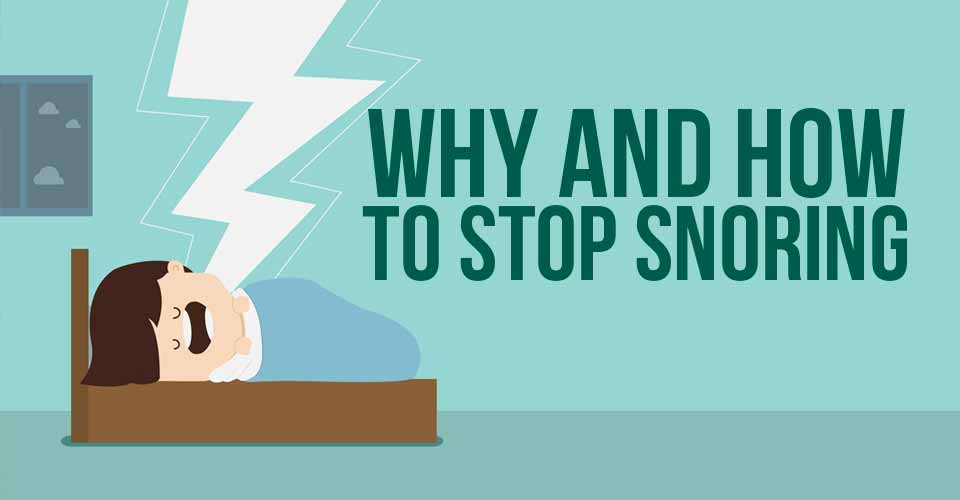
Your snoring is not only annoying your partner – it is also harming your mind and body. Because snoring decreases both the quality and quantity of your sleep, it can contribute to depression, weight gain, heart disease, mental health problems, and diabetes, ultimately putting you at an increased risk for an early death. Since nearly half of adults are known to snore at least some of the time, chances are pretty good that it has an effect on someone in your bedroom. Fortunately though, there are steps you can take to identify the cause of your snoring problem and put an end to it once and for all.
Why do you snore?
Snoring occurs when air, rather than moving straight through the nose and throat, becomes obstructed and causes the nearby tissue to vibrate. Some causes of snoring, such as pregnancy, allergies and congestion, sinus problems, certain medications such as muscle relaxers, or even a night of heavy drinking, are likely to pass on their own. Others, such as smoking and obesity, may require an intensive overhaul in lifestyle to change. However, still other types of snoring, caused by aging or genetics, are simply unavoidable.
Some people, unfortunately, live in a state of complete denial when it comes to their snoring. Thankfully, there are some signs to look for besides the telltale sound. If you often wake up with a dry mouth or sore throat, then you, my friend, might have a snoring problem. Sorry you had to find out this way.
If your snoring is severe enough to lead to sleep apnea, you may experience other troubling symptoms. You may stop breathing or even choke while you are asleep, which can disrupt your brain’s functionality during the following day. This can cause daytime fatigue, headaches, irritability, and trouble focusing on tasks. Coffee can only do so much – at this point, it’s time to address the root of the problem.
What can you do to curb your chances of snoring tonight?
- Keep your body hydrated. There are a million reasons why you should probably be drinking more water, and this is one of them. Nasal dryness leads to snoring, and is so easily prevented. Try to get eight glasses a day.
- For the same reason, you should put an end to dryness in your air. Today’s humidifiers are attractive, easy to use, and great for your skin. Because of the dry Colorado air and our son’s eczema, we own several.
- Try sleeping on your side. Sleeping on your back or stomach can increase your chances of snoring, and sleeping on your left side, in particular, offers additional health benefits. Sleeping in a new position can feel awkward at first, but it’s certainly better than sleeping alone.
- Don’t drink alcohol right before bed. I know, I’m no fun, but neither is your snoring. Save the boozing for bottomless mimosas tomorrow at brunch.
- Use a mouthpiece. This is an oral appliance that you put over your teeth at bedtime. Mouthpieces like are meant to keep your airway open, so it does not get stuck and cause the tissue vibration mentioned above.
- If your snoring is caused by allergies or congestion, you may simply need to open up your nasal passages. This will make you more comfortable in addition to relieving your snoring. You can do this with a hot, steamy shower, nasal strips, or a neti pot. Your partner will thank you.
How can you lessen your risk for snoring in the future?
1. Wash your sheets regularly. If you are sleeping in a filthy cocoon of dust, pollen, and pet dander, your nasal passages are sure to react accordingly. In fact, dust mites and other allergens could be hiding all over your room, so you should probably give the whole place a thorough scrubbing. Don’t bother making the bed, though – oddly enough, this could actually increase your chance of having dust mites!
2. Quit smoking. There are a million reasons to do this, and you’ve probably heard them all. I feel compelled, however, to make sure that snoring is on that list. Breathe easier, save money, snore less, and live longer. Start cutting back today.
3. Try some mouth and throat exercises. You may feel like a dork, but doing this on a regular basis can strengthen your respiratory muscles, making them less likely to inhibit air flow while you sleep.
4. Start a workout regimen. As with quitting smoking, the reasons to do this are seemingly infinite – and this is one to add to the list. Besides the obvious effect of decreasing your risk for obesity, exercise has a positive impact on your immune system, making you less vulnerable to congestion.
Hopefully you (or your loved one) found one of these suggestions to be helpful. Between stress, work, and family life, nobody needs an extra hurdle to a good night’s sleep. Start taking steps to cut back on your snoring tonight, and your body, mind, and bedmate are sure to thank you tomorrow!


